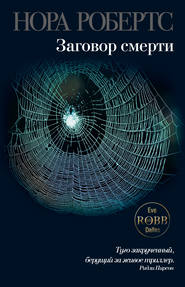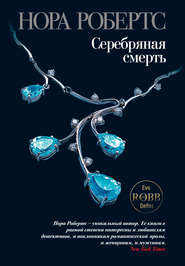По всем вопросам обращайтесь на: info@litportal.ru
(©) 2003-2025.
✖
Hidden Star: the classic story from the queen of romance that you won’t be able to put down
Автор
Год написания книги
2019
Настройки чтения
Размер шрифта
Высота строк
Поля
Hidden Star: the classic story from the queen of romance that you won’t be able to put down
Nora Roberts
THE INTERNATIONAL BESTSELLING AUTHOR‘The most successful novelist on Planet Earth’ Washington PostShe couldn’t remember a thing, not even who she was. But it was clear Bailey James was in trouble. Big trouble! And she desperately needed Cade Parris to help her live long enough to find out just what kind. The moment the coolheaded private eye laid eyes on the fragile beauty, she almost had him forgetting who he was.If Bailey was a criminal, Cade would eat his P. I. license. But what was she doing with a satchel full of cash and a diamond as big as a baby’s fist? And how could he unravel this mystery if he kept tripping over his heart?Book #1 of THE STARS OF MITHRA series.Nora Roberts is a publishing phenomenon; this New York Times bestselling author of over 200 novels has more than 450 million of her books in print worldwide.Praise for Nora Roberts'The most successful novelist on Planet Earth' - Washington Post‘A storyteller of immeasurable diversity and talent’ - Publisher’s Weekly
Hidden Star
Stars of Mithra
Book One
Nora Roberts
www.millsandboon.co.uk (http://www.millsandboon.co.uk)
She couldn't remember a thing, not even who she was. But it was clear Bailey James was in trouble. Big trouble! And she desperately needed Cade Parris to help her live long enough to find out just what kind.
The moment the coolheaded private eye laid eyes on the fragile beauty, she almost had him forgetting who he was. If Bailey was a criminal, Cade would eat his P.I. license. But what was she doing with a satchel full of cash and a diamond as big as a baby's fist? And how could he unravel this mystery if he kept tripping over his heart?
To white knights and their damsels
Contents
Chapter One
Chapter Two
Chapter Three
Chapter Four
Chapter Five
Chapter Six
Chapter Seven
Chapter Eight
Chapter Nine
Chapter Ten
Chapter Eleven
Chapter Twelve
Epilogue
Chapter 1
Cade Parris wasn’t having the best of days when the woman of his dreams walked into his office. His secretary had quit the day before—not that she’d been much of a prize anyway, being more vigilant about her manicure than maintaining the phone logs. But he needed someone to keep track of things and shuffle papers into files. Even the raise he offered out of sheer desperation hadn’t swayed her to give up her sudden determination to become a country-and-western singing sensation.
So his secretary was heading off to Nashville in a second-hand pickup, and his office looked like the ten miles of bad road he sincerely hoped she traveled.
She hadn’t exactly had her mind on her work the past month or two. That impression had been more than confirmed when he fished a bologna sandwich out of the file drawer. At least he thought the blob in the plastic bag was bologna. And it had been filed under L—for Lunch?
He didn’t bother to swear, nor did he bother to answer the phone that rang incessantly on the empty desk in his reception area. He had reports to type up, and as typing wasn’t one of his finer skills, he just wanted to get on with it.
Parris Investigations wasn’t what some would call a thriving enterprise. But it suited him, just as the cluttered two-room office squeezed into the top floor of a narrow brick building with bad plumbing in North West D.C. suited him.
He didn’t need plush carpets or polished edges. He’d grown up with all that, with the pomp and pretenses, and had had his fill of it all by the time he reached the age of twenty. Now, at thirty, with one bad marriage behind him and a family who continued to be baffled by his pursuits, he was, by and large, a contented man.
He had his investigator’s license, a decent reputation as a man who got the job done, and enough income to keep his agency well above water.
Though actual business income was a bit of a problem just then. He was in what he liked to call a lull. Most of his caseload consisted of insurance and domestic work—a few steps down from the thrills he’d imagined when he set out to become a private investigator. He’d just cleaned up two cases, both of them minor insurance frauds that hadn’t taken much effort or innovation to close.
He had nothing else coming in, his greedy bloodsucker of a landlord was bumping up his rent, the engine in his car had been making unsettling noises lately, his air conditioner was on the fritz. And the roof was leaking again.
He took the spindly yellow-leafed philodendron his double-crossing secretary had left behind and set it on the uncarpeted floor under the steady drip, hoping it might drown.
He could hear a voice droning into his answering machine. It was his mother’s voice. Lord, he thought, did a man ever really escape his mother?
“Cade, dear, I hope you haven’t forgotten the Embassy Ball. You know you’re to escort Pamela Lovett. I had lunch with her aunt today, and she tells me that Pamela just looks marvelous after her little sojourn to Monaco.”
“Yeah, yeah, yeah,” he muttered, and narrowed his eyes at the computer. He and machines had poor and untrusting relationships.
He sat down and faced the screen as his mother continued to chatter: “Have you had your tux cleaned? Do make time to get a haircut, you looked so scraggly the last time I saw you.”
And don’t forget to wash behind the ears, he thought sourly, and tuned her out. She was never going to accept that the Parris life-style wasn’t his life-style, that he just didn’t want to lunch at the club or squire bored former debutantes around Washington and that his opinion wasn’t going to change by dint of her persuasion.
He’d wanted adventure, and though struggling to type up a report on some poor slob’s fake whiplash wasn’t exactly Sam Spade territory, he was doing the job.
Mostly he didn’t feel useless or bored or out of place. He liked the sound of traffic outside his window, even though the window was only open because the building and its scum-sucking landlord didn’t go in for central air-conditioning and his unit was broken. The heat was intense, and the rain was coming in, but with the window closed, the offices would have been as airless and stifling as a tomb.
Sweat rolled down his back, making him itchy and irritable. He was stripped down to a T-shirt and jeans, his long fingers fumbling a bit on the computer keys. He had to shovel his hair out of his face several times, which ticked him off. His mother was right. He needed a haircut.
So when it got in the way again, he ignored it, as he ignored the sweat, the heat, the buzz of traffic, the steady drip from the ceiling. He sat, methodically punching a key at a time, a remarkably handsome man with a scowl on his face.
He’d inherited the Parris looks—the clever green eyes that could go broken-bottle sharp or as soft as sea mist, depending on his mood. The hair that needed a trim was dark mink brown and tended to wave. Just now, it curled at his neck, over his ears, and was beginning to annoy him. His nose was straight, aristocratic and a little long, his mouth firm and quick to smile when he was amused. And to sneer when he wasn’t.
Though his face had become more honed since the embarrassing cherubic period of his youth and early adolescence, it still sported dimples. He was looking forward to middle age, when, with luck, they’d become manly creases.
He’d wanted to be rugged, and instead was stuck with the slick, dreamy good looks of a GQ cover—for one of which he’d posed in his middle twenties, under protest and great family pressure.
The phone rang again. This time he heard his sister’s voice, haranguing him about missing some lame cocktail party in honor of some bigbellied senator she was endorsing.
He thought about just ripping the damn answering machine out of the wall and heaving it, and his sister’s nagging voice, out the window into the traffic on Wisconsin Avenue.
Then the rain that was only adding to the miserably thick heat began to drip on the top of his head. The computer blinked off, for no reason he could see other than sheer nastiness, and the coffee he’d forgotten he was heating boiled over with a spiteful hiss.
Nora Roberts
THE INTERNATIONAL BESTSELLING AUTHOR‘The most successful novelist on Planet Earth’ Washington PostShe couldn’t remember a thing, not even who she was. But it was clear Bailey James was in trouble. Big trouble! And she desperately needed Cade Parris to help her live long enough to find out just what kind. The moment the coolheaded private eye laid eyes on the fragile beauty, she almost had him forgetting who he was.If Bailey was a criminal, Cade would eat his P. I. license. But what was she doing with a satchel full of cash and a diamond as big as a baby’s fist? And how could he unravel this mystery if he kept tripping over his heart?Book #1 of THE STARS OF MITHRA series.Nora Roberts is a publishing phenomenon; this New York Times bestselling author of over 200 novels has more than 450 million of her books in print worldwide.Praise for Nora Roberts'The most successful novelist on Planet Earth' - Washington Post‘A storyteller of immeasurable diversity and talent’ - Publisher’s Weekly
Hidden Star
Stars of Mithra
Book One
Nora Roberts
www.millsandboon.co.uk (http://www.millsandboon.co.uk)
She couldn't remember a thing, not even who she was. But it was clear Bailey James was in trouble. Big trouble! And she desperately needed Cade Parris to help her live long enough to find out just what kind.
The moment the coolheaded private eye laid eyes on the fragile beauty, she almost had him forgetting who he was. If Bailey was a criminal, Cade would eat his P.I. license. But what was she doing with a satchel full of cash and a diamond as big as a baby's fist? And how could he unravel this mystery if he kept tripping over his heart?
To white knights and their damsels
Contents
Chapter One
Chapter Two
Chapter Three
Chapter Four
Chapter Five
Chapter Six
Chapter Seven
Chapter Eight
Chapter Nine
Chapter Ten
Chapter Eleven
Chapter Twelve
Epilogue
Chapter 1
Cade Parris wasn’t having the best of days when the woman of his dreams walked into his office. His secretary had quit the day before—not that she’d been much of a prize anyway, being more vigilant about her manicure than maintaining the phone logs. But he needed someone to keep track of things and shuffle papers into files. Even the raise he offered out of sheer desperation hadn’t swayed her to give up her sudden determination to become a country-and-western singing sensation.
So his secretary was heading off to Nashville in a second-hand pickup, and his office looked like the ten miles of bad road he sincerely hoped she traveled.
She hadn’t exactly had her mind on her work the past month or two. That impression had been more than confirmed when he fished a bologna sandwich out of the file drawer. At least he thought the blob in the plastic bag was bologna. And it had been filed under L—for Lunch?
He didn’t bother to swear, nor did he bother to answer the phone that rang incessantly on the empty desk in his reception area. He had reports to type up, and as typing wasn’t one of his finer skills, he just wanted to get on with it.
Parris Investigations wasn’t what some would call a thriving enterprise. But it suited him, just as the cluttered two-room office squeezed into the top floor of a narrow brick building with bad plumbing in North West D.C. suited him.
He didn’t need plush carpets or polished edges. He’d grown up with all that, with the pomp and pretenses, and had had his fill of it all by the time he reached the age of twenty. Now, at thirty, with one bad marriage behind him and a family who continued to be baffled by his pursuits, he was, by and large, a contented man.
He had his investigator’s license, a decent reputation as a man who got the job done, and enough income to keep his agency well above water.
Though actual business income was a bit of a problem just then. He was in what he liked to call a lull. Most of his caseload consisted of insurance and domestic work—a few steps down from the thrills he’d imagined when he set out to become a private investigator. He’d just cleaned up two cases, both of them minor insurance frauds that hadn’t taken much effort or innovation to close.
He had nothing else coming in, his greedy bloodsucker of a landlord was bumping up his rent, the engine in his car had been making unsettling noises lately, his air conditioner was on the fritz. And the roof was leaking again.
He took the spindly yellow-leafed philodendron his double-crossing secretary had left behind and set it on the uncarpeted floor under the steady drip, hoping it might drown.
He could hear a voice droning into his answering machine. It was his mother’s voice. Lord, he thought, did a man ever really escape his mother?
“Cade, dear, I hope you haven’t forgotten the Embassy Ball. You know you’re to escort Pamela Lovett. I had lunch with her aunt today, and she tells me that Pamela just looks marvelous after her little sojourn to Monaco.”
“Yeah, yeah, yeah,” he muttered, and narrowed his eyes at the computer. He and machines had poor and untrusting relationships.
He sat down and faced the screen as his mother continued to chatter: “Have you had your tux cleaned? Do make time to get a haircut, you looked so scraggly the last time I saw you.”
And don’t forget to wash behind the ears, he thought sourly, and tuned her out. She was never going to accept that the Parris life-style wasn’t his life-style, that he just didn’t want to lunch at the club or squire bored former debutantes around Washington and that his opinion wasn’t going to change by dint of her persuasion.
He’d wanted adventure, and though struggling to type up a report on some poor slob’s fake whiplash wasn’t exactly Sam Spade territory, he was doing the job.
Mostly he didn’t feel useless or bored or out of place. He liked the sound of traffic outside his window, even though the window was only open because the building and its scum-sucking landlord didn’t go in for central air-conditioning and his unit was broken. The heat was intense, and the rain was coming in, but with the window closed, the offices would have been as airless and stifling as a tomb.
Sweat rolled down his back, making him itchy and irritable. He was stripped down to a T-shirt and jeans, his long fingers fumbling a bit on the computer keys. He had to shovel his hair out of his face several times, which ticked him off. His mother was right. He needed a haircut.
So when it got in the way again, he ignored it, as he ignored the sweat, the heat, the buzz of traffic, the steady drip from the ceiling. He sat, methodically punching a key at a time, a remarkably handsome man with a scowl on his face.
He’d inherited the Parris looks—the clever green eyes that could go broken-bottle sharp or as soft as sea mist, depending on his mood. The hair that needed a trim was dark mink brown and tended to wave. Just now, it curled at his neck, over his ears, and was beginning to annoy him. His nose was straight, aristocratic and a little long, his mouth firm and quick to smile when he was amused. And to sneer when he wasn’t.
Though his face had become more honed since the embarrassing cherubic period of his youth and early adolescence, it still sported dimples. He was looking forward to middle age, when, with luck, they’d become manly creases.
He’d wanted to be rugged, and instead was stuck with the slick, dreamy good looks of a GQ cover—for one of which he’d posed in his middle twenties, under protest and great family pressure.
The phone rang again. This time he heard his sister’s voice, haranguing him about missing some lame cocktail party in honor of some bigbellied senator she was endorsing.
He thought about just ripping the damn answering machine out of the wall and heaving it, and his sister’s nagging voice, out the window into the traffic on Wisconsin Avenue.
Then the rain that was only adding to the miserably thick heat began to drip on the top of his head. The computer blinked off, for no reason he could see other than sheer nastiness, and the coffee he’d forgotten he was heating boiled over with a spiteful hiss.

















